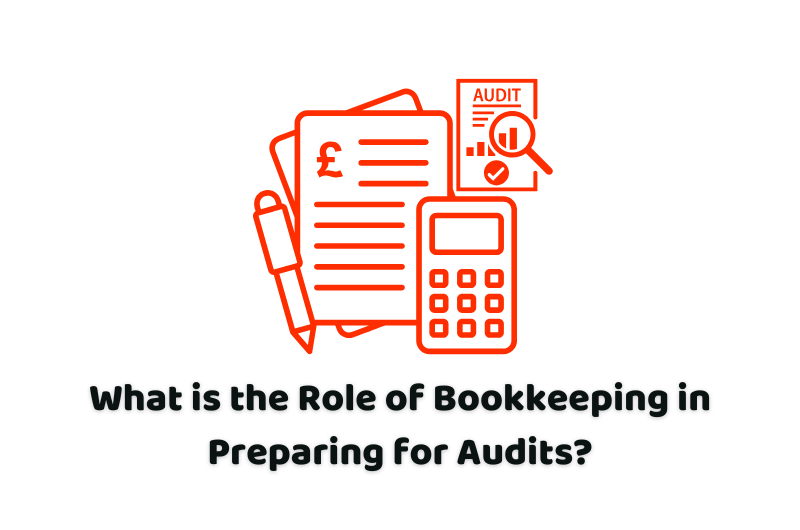What is the Role of Bookkeeping in Preparing for Audits?
What is the role of bookkeeping in preparing for audits? A business that maintains proper accounting records remains prepared for audits throughout the year. Auditors verify the same records which later help business owners enhance their financial choices. A business depends entirely on precise bookkeeping for auditing purposes. This guide provide you with comprehensive information about the role of bookkeeping in preparing for audits.
Talk to one of our intelligent and clever professional bookkeepers to get your further queries about bookkeeping services in London. We will be sure to come up with the best possible solution for you.
What is the Role of Bookkeeping in Preparing for Audits?
Bookkeeping maintains central importance for business audits because it ensures a company remains prepared for inspections at all times. Businesses maintain accurate financial recordkeeping to reduce their anxiety levels and prevent penalties as well as to make auditors face no obstacles in accessing needed information. A business can experience a smooth audit together with reduced stress and derive greater business advantages from having proper accounting records. There are some key points highlighted that demonstrate the role of bookkeeping in preparing for audits:
1. Keeping Financial Statements Accurate and Useful
Audit professionals perform detailed assessments of income statements together with balance sheet data to locate mistakes. The smooth operation of this process depends on proper bookkeeping which simultaneously generates benefits for the business.
An accurate balance sheet at all times enables owners to use the document for assessing liquidity status and reviewing solvency position and identifying funding possibilities. The maintenance of current records lets organizations detect unused assets while enhancing their financial strategy.
A business can track revenue and determine its best-performing products or services and investigate expansion possibilities through an accurate income statement. Through its application businesses become able to effectively manage costs while decreasing waste while applying cost-saving plans.
2. Managing Cash Flow Effectively
The purpose of auditors during financial audits is to examine cash flow statements for accuracy. Proper bookkeeping enables accurate real-time recording of financial documents which remain available for inspection. Financial audits represent only one advantage from what turns out to be a wider range of benefits.
A proper bookkeeping system enables owners to accurately track and enhance their business cash flow situation. Through good bookkeeping business owners obtain financial confidence about their ability to fulfill obligations while preserving market liquidity and capital investment potential.
The practice of regular cash flow forecasting receives beneficial support from good bookkeeping practices. Good bookkeeping systems enable organisations to schedule their bills and monitor inventory purchases and detect cash-related problems ahead of time.
3. Conducting a Thorough Accounts Receivable Analysis
Business financial stability depends heavily on deep examination of accounts receivable. Businesses require accurate up-to-date bookkeeping just as auditors do to effectively measure their receivables. The management of collections needs to be efficient for maintaining continuous cash flow. The organization needs to focus on unpaid and difficult-to-collect invoices.
A well-kept set of books provides all the answers necessary to address fundamental financial questions.
- Do available funds reach short-term requirements?
- Do customers face excessively demanding credit terms or does the credit policy need improvement?
The proper organisation of accounts receivable data helps businesses establish better collection strategies while preventing cash shortages thereby ensuring beneficial financial operations.
4. Preventing and Detecting Fraud
Business owners need audits for detecting fraud so they should not depend on audits alone to discover financial misconduct. Internal control measures within strong bookkeeping systems both help minimise and detect fraudulent activities at an early stage.
Key practices include:
- A business should maintain precise detailed financial documentation.
- Performing regular account reconciliations
- Implementing proper segregation of duties
- Conducting scheduled financial reviews
Such procedures stop invalid transactions while demonstrating unusual discrepancies thus supporting the business’ financial integrity and trustworthiness.
5. Reduce Tax Liability with Proper Bookkeeping
If you need to face an IRS examination people prefer having their financial records organised to make the process less stressful. Businesses can reduce their tax burden while obtaining maximum financial advantages through accurate book maintenance beyond auditing preparedness. A strong bookkeeping system ensures:
- First-Class Expense Tracking Lets Business Owners Claim All Lawful Deductions to Reduce Their Taxable Income.
- The possession of reliable records enables owners as well as managers to make sound financial choices about depreciation strategies and tax-saving opportunities and asset investments.
- The proactive approach to bookkeeping enables businesses to improve their tax methods while minimizing their obligations which helps them maintain additional profits for expansion.
6. Enhanced Efficiency and Peace of Mind
Owners who trust their bookkeeping systems enjoy both audit-related advantages and sustained operational efficiency together with mental relaxation. A properly maintained financial record-keeping process must exactly register all business transactions and expenses and revenues so audits become stress-free.
The elimination of catch-up stress allows business owners and their managers to focus entirely on business operations and planning strategies as well as growth possibilities. The team devotes its energy to making decisions as well as providing customer support while working to expand business operations since vital time is no longer lost seeking lost documents or correcting mistakes. A systematic organizational structure enables companies to operate effectively while preserving compliance regulations before performing financial review assessments.
Conclusion
The role of bookkeeping in preparing for audits is predicted, as it enables business leaders to track company growth instead of working on record maintenance. The combination of both tax optimisation and fraud prevention along with decision-making and cash flow management constitutes one of the positive effects of maintaining proper bookkeeping.
Disclaimer: All the information provided in this article on the role of bookkeeping in preparing for audits, including all the text and graphics, is general in nature. It does not intend to disregard any professional advice.

